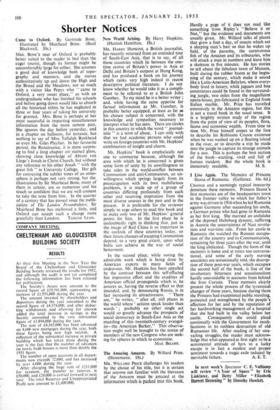CHANGE and a seemingly typical insecurity dominate these memoirs. Princess
Ileana's first memories are of the headquarters town in the frontier valley to which her father's army was driven in 1916 when he led Rumania against Germany after succeeding his uncle, a German prince who had gone to Rumania as her first king. She married an archduke of the deposed Habsburg dynasty, suffering in Austria the uncertainties of Nazi revolu- tion and war-time rule. From her castle in Rumania she watched the Russian occupa- tion of the country and its Communisation,' remaining for three years after the war, until the king abdicated. Though the form of the memoirs is loose and at times too conversa- tional, and some of the early nursing anecdotes are sensationally told, the descrip- tion of these post-war year's, which occupies the second half of the book, is free of the involuntary bitterness and sensationalism hardly unavoidable in accounts from behind the Iron Curtain. These memoirs clearly present the whole process of the tyrannical changes of those years, because during them the Princess had exceptional public standing, protected and strengthened by the people's affection for her and by the reputation of her hardworking management -of a hospital that she had built in the valley below her. castle. Consequently she could plead continually with the Government for modi- fications in its ruthless destruction of old Rumanian life. After reading of her una- vailing struggles, the reader must acknow- ledge that what appeared at first sight to be a sentimental attitude of hers to a lucky escape is in fact a modest and proper sentiment towards a tragic exile induced by


































 Previous page
Previous page